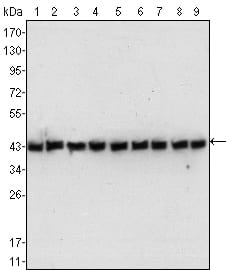
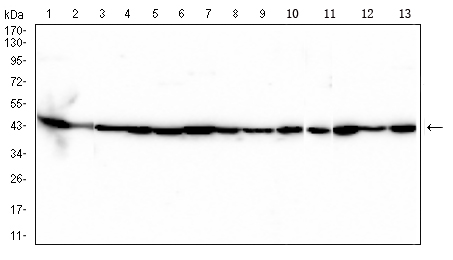
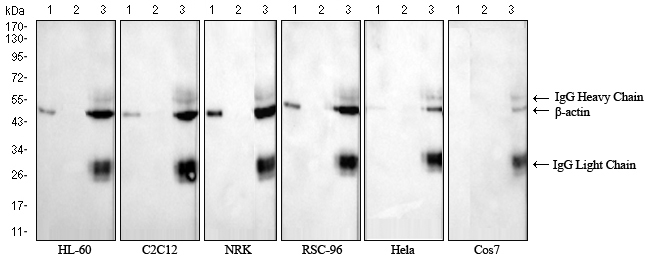
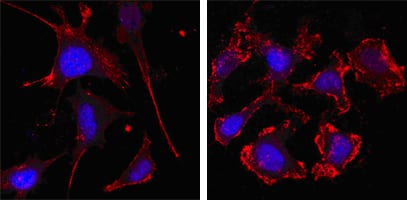
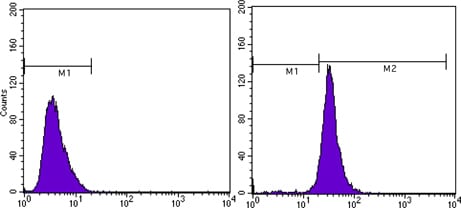
| WB | 1/10000 - 1/40000 | Human,Mouse,Hamster,Rat,Monkey,Dog |
| IF | 1/100-1/200 | Human,Mouse,Hamster,Rat,Monkey,Dog |
| IHC | 咨询技术 | Human,Mouse,Hamster,Rat,Monkey,Dog |
| ICC | 1/50 - 1/500 | Human,Mouse,Hamster,Rat,Monkey,Dog |
| FCM | 1/200 - 1/400 | Human,Mouse,Hamster,Rat,Monkey,Dog |
| Elisa | 1/10000 | Human,Mouse,Hamster,Rat,Monkey,Dog |
| Aliases | PS1TP5BP1; ACTB |
| Entrez GeneID | 60 |
| clone | 8H10D10 |
| WB Predicted band size | 42kDa |
| Host/Isotype | Mouse IgG2b |
| Antibody Type | Loading Control Antibody |
| Storage | Store at 4°C short term. Aliquot and store at -20°C long term. Avoid freeze/thaw cycles. |
| Species Reactivity | Human,Mouse,Hamster,Rat,Monkey,Dog |
| Immunogen | Synthetic peptide corresponding to amino-terminal residues of human beta-Actin, conjugated to KLH. |
| Formulation | Purified antibody in PBS with 0.05% sodium azide. |
+ +
1. **"β-Actin is not a reliable loading control in Western blot analysis"**
- 作者:Gilda, J.E. 和 Misteli, T.
- 摘要:研究通过分析不同实验条件下β-Actin蛋白表达的稳定性,发现其在某些细胞类型或处理(如药物处理)中表达量波动显著,质疑其作为Western blot内参的普适性,建议根据实验体系选择更稳定的内参蛋白(如GAPDH)。
2. **"A draft map of the human proteome"**
- 作者:Uhlen, M. 等
- 摘要:该大规模蛋白质组学研究系统验证了多种抗体(包括β-Actin抗体)的特异性,强调β-Actin作为广泛表达的管家蛋白的实用性,但提出需结合组织/细胞类型特异性标志物进行数据标准化。
3. **"β-Actin specifically controls cell cycle progression via gene network modulation"**
- 作者:Tondeleir, D. 等
- 摘要:通过基因敲除和抗体标记实验,揭示β-Actin除细胞骨架功能外,还参与调控细胞周期相关基因表达,提示使用其抗体时需注意实验条件对功能的影响,避免误判内参稳定性。
4. **"Housekeeping proteins: A preliminary study illustrating some alterations as measured in Western blotting"**
- 作者:Ferguson, R.E. 等
- 摘要:比较β-Actin、α-Tubulin等常用内参在不同组织样本中的表达差异,发现β-Actin在肌肉和肝脏中丰度较高但存在剪切变体,建议Western blot中需通过预实验确认抗体识别单一目标条带。
Beta-actin, a highly conserved cytoskeletal protein, is a member of the actin family essential for cell structure, motility, and integrity. It is ubiquitously expressed in eukaryotic cells, making it a widely used loading control in Western blotting, immunofluorescence, and other protein detection assays to normalize data and confirm equal protein loading across samples. Beta-actin antibodies are critical tools for detecting this ~42 kDa protein, helping researchers account for experimental variability.
These antibodies are typically raised in hosts like rabbits or mice, targeting specific epitopes of beta-actin. Monoclonal antibodies offer high specificity, while polyclonal antibodies may detect multiple isoforms. Their applications extend beyond Western blots to immunohistochemistry, flow cytometry, and RNA-protein interaction studies (e.g., RIP-seq). However, beta-actin’s expression can vary under certain conditions (e.g., cell differentiation, stress, or cancer), prompting validation with alternative housekeeping proteins (e.g., GAPDH, tubulin) to ensure data reliability.
Commercial beta-actin antibodies often include validation data (e.g., knockout cell line testing) to confirm specificity. Despite its limitations, beta-actin remains a cornerstone in experimental workflows due to its stability and ease of detection, providing a baseline for comparative protein analysis in diverse biological contexts.
×